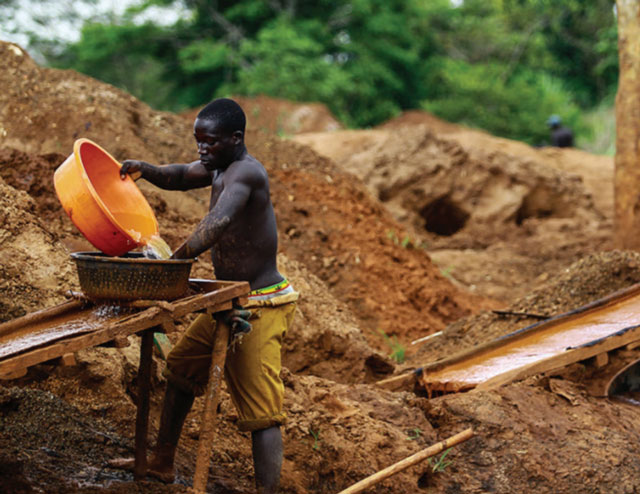
Kampala, Uganda | THE INDEPENDENT | The persistent use of hazardous substances by artisanal and small scale miners in gold sites is perturbing environmentalists and health rights activists in gold-rich Buhweju district.
The groups say that artisanal miners are continuously using toxic mercury to extract minute pieces of gold that is mixed in the soil, and other materials. The process entails mixing mercury with materials containing Gold, in order to form a mercury-gold amalgam, which is later heated to a temperature that vaporizes the mercury and leaves behind the Gold.
Our reporter has observed that most of the artisanal miners add the material in their basins with silt suspected to have gold so that mercury attracts all the gold particles in the mixture.
But the practice damages the nervous, digestive, and immune systems and the lungs and kidneys as a result of inhaling, ingesting, or even just physical contact with mercury. It can affect speech, sight and cognitive organs in humans, according to the World Health Organisation-WHO, and is equally dangerous for animals, and the environment.
Unlike other mining areas across the country, the gold deposits in Buhweju are majorly located in water catchment areas. As a result, the deadly liquid metal is often disposed of into wetlands and streams whose waters are used by residents.
Seretiano Ahimbisibwe, an artisanal miner operating from Engaju sub county notes that all streams flowing in this area are rich in gold which they keep hunting from the silt carried by the streams. He, however, notes that without mercury little or no gold can be obtained.
“With the help of mercury, you can get gold without much effort. it has simplified our job. instead of taking hours washing the silt, mercury can do this in no moment,” Ahimbisibwe said.
Buhweju district environment officer Clemencia Birungi notes that the use of the hazardous liquid metal was introduced by non-resident miners who stormed the area recently after being evicted from Mubende. She adds that the vice is spreading very first and efforts of controlling it have all failed.
The Executive Director of West Ankole Civil Society Forum Apollo Kakonge says that they have tried to advise the miners to shun the use of mercury in vain. Kakonge says that the impacts of the use of mercury will not only affect residents in Buhweju but many others who live downstream.
Meanwhile, Buhweju district officials also suspect that the Chinese mining company operating deep in the Kashoha-Kitomi forest reserve might be using similar chemicals. However, area leaders cannot access the place due to heavy security deployment.
Our reporter dared to visit one of the sites which have since been turned into a camp for workers. From there, one can see that the precious metal is extracted from waterlogged banks of River Kyonyo, a possible time bomb for all communities surviving from the water body, in the event that any toxic material is used in the extraction.
Birungi says that the district leadership is engaging experts to assess the impact, or likely impacts, of chemicals used by miners in the area. The assessment will involve analyzing the quality of water in several streams among other tests.
In 2017, the National Association of Professional Environmentalists-NAPE tracked the health and environmental footprint of mercury caused by the activities of artisanal and small scale miners and their shocking finding projected a disaster if the use of the said substance is not checked. To address the problem, they launched a project which intended to create mercury-free gold mining. However, their efforts are yet to bear fruit.
Emmanuel Kibirige, Uganda Association of Artisanal and Small-scale Miners National coordinator, stresses that having mercury-free mining areas in Uganda is a dream in the absence of better alternatives.
******
URN
 The Independent Uganda: You get the Truth we Pay the Price
The Independent Uganda: You get the Truth we Pay the Price



